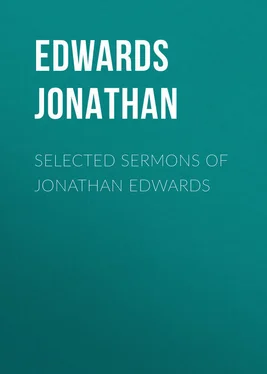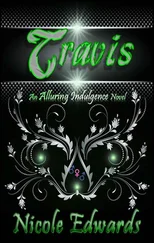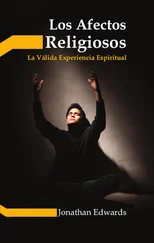Jonathan Edwards - Selected Sermons of Jonathan Edwards
Здесь есть возможность читать онлайн «Jonathan Edwards - Selected Sermons of Jonathan Edwards» — ознакомительный отрывок электронной книги совершенно бесплатно, а после прочтения отрывка купить полную версию. В некоторых случаях можно слушать аудио, скачать через торрент в формате fb2 и присутствует краткое содержание. Жанр: foreign_religion, foreign_antique, foreign_prose, на английском языке. Описание произведения, (предисловие) а так же отзывы посетителей доступны на портале библиотеки ЛибКат.
- Название:Selected Sermons of Jonathan Edwards
- Автор:
- Жанр:
- Год:неизвестен
- ISBN:нет данных
- Рейтинг книги:3 / 5. Голосов: 1
-
Избранное:Добавить в избранное
- Отзывы:
-
Ваша оценка:
- 60
- 1
- 2
- 3
- 4
- 5
Selected Sermons of Jonathan Edwards: краткое содержание, описание и аннотация
Предлагаем к чтению аннотацию, описание, краткое содержание или предисловие (зависит от того, что написал сам автор книги «Selected Sermons of Jonathan Edwards»). Если вы не нашли необходимую информацию о книге — напишите в комментариях, мы постараемся отыскать её.
Selected Sermons of Jonathan Edwards — читать онлайн ознакомительный отрывок
Ниже представлен текст книги, разбитый по страницам. Система сохранения места последней прочитанной страницы, позволяет с удобством читать онлайн бесплатно книгу «Selected Sermons of Jonathan Edwards», без необходимости каждый раз заново искать на чём Вы остановились. Поставьте закладку, и сможете в любой момент перейти на страницу, на которой закончили чтение.
Интервал:
Закладка:
Jonathan Edwards
Selected Sermons of Jonathan Edwards
INTRODUCTION
Jonathan Edwards was born October 5, 1703, in what is now South Windsor, Conn., a part of the parish then known as “Windsor Farmes.” His father, the Rev. Timothy Edwards, the minister of the parish, a Harvard graduate, was reputed a man of superior ability and polished manners, a lover of learning as well as of religion; in addition to his pastoral duties, he fitted young men for college, and his liberal views of education appear in the fact that he made his daughters pursue the same studies these youths did. His mother, a daughter of the Rev. Solomon Stoddard, the minister of Northampton, is said to have resembled her distinguished father in strength of character and to have surpassed her husband in the native vigor of her mind. As regards remoter ancestry and their intellectual and moral qualities, Edwards seems also to have been well born; an exception, however, must be made of the eccentric and possibly insane grandmother on his father’s side, whose outrageous conduct led to her divorce. 1 1 See J. A. Stoughton, Windsor Farmes , p. 39 and p. 69 n. Students of heredity may perhaps here find a clew to the character of Edwards’s brilliant, wayward grandson, Aaron Burr.
Brought up the only son in a family of ten daughters, apart from all distracting influences, in an atmosphere of religion and serious study in the home, amid natural surroundings of meadows, woods, and low-lying distant hills singularly conducive to a life of contemplation, the boy early developed that absorbing interest in the things of the spirit, and that astonishing acuteness of intellect which are the most prominent characteristics of his genius. While a mere child he spent much of his time in religious exercises and in conversation on religious matters with other boys, with some of whom he joined to build a booth in a retired spot in a swamp for secret prayer; he had besides several other such places for prayer in the woods to which he was wont to retire. His mind also dwelt much on the doctrines he was taught, especially on the doctrine of God’s sovereignty in election, against which he at that time violently rebelled. When only ten years of age he wrote a short, quaint, somewhat humorous little tract on the immortality of the soul; at about twelve he composed a remarkably accurate and ingenious paper on the habits of the “flying spider.”
He entered the Collegiate School of Connecticut at Saybrook – afterwards Yale College – at thirteen, and in 1720, shortly before his seventeenth birthday, graduated at New Haven with the valedictory. In his Sophomore year he made the acquaintance of Locke’s Essay on the Human Understanding – a work which left a permanent impress on his thinking. He read it, he says, with a far higher pleasure “than the most greedy miser finds when gathering up handfuls of silver and gold from some newly-discovered treasure.” Under its influence he began a series of Notes on the Mind, with a view to a comprehensive treatise on mental philosophy. He also began, possibly somewhat later, a series of Notes on Natural Science, with reference to a similar work on natural philosophy. It is in these early writings that we find the outlines of an idealistic theory which resembles, but was probably not at all derived from, that of Berkeley, and which seems to have remained a determining factor in his speculations to the last. 2 2 See H. N. Gardiner, The Early Idealism of Edwards in Jonathan Edwards: a Retrospect, pp. 115-160: Boston, 1901. Cf. J. H. MacCracken, The Sources of Jonathan Edwards’s Idealism , Philos. Rev., xi. 26 ff. (Jan. 1902).
After graduating he continued to reside for two years in New Haven, studying for the ministry. From August, 1722, till the following April he supplied the pulpit of a small Presbyterian congregation in New York, but declined the invitation to remain as their minister. After returning to his father’s home in Windsor, he received at least two other calls, one of which he seems to have accepted. 3 3 That to the church at Bolton, Conn. But for some reason, not now apparent, he was never installed there. See S. Simpson, Jonathan Edwards – a Historical Review , Hartford Seminary Record. xiv. 11 (November, 1903).
In September, 1723, he went to New Haven to receive his Master’s degree, was appointed a tutor at the college, entered upon the active duties of that office in June, 1724, and continued in the same till September, 1726, when he resigned his tutorship to become colleague-pastor with his grandfather Stoddard in the church at Northampton.
The spiritual history of Edwards in these years of growth from youth to early manhood is recorded by his own hand in a narrative of personal experiences written at a later date for his own use, in fragments of a diary, and in a series of resolutions which he drew up for the conduct of his own life. These documents, which were first published by his biographer and descendant, Sereno E. Dwight, in 1829, throw a flood of light on Edwards’s character and temperament, and serve to explain much in his life which would otherwise be obscure. He tells us in his narrative how the childish delight in the exercises of religion before referred to gradually declined; how at length “he turned like a dog to his vomit, and went on in the ways of sin;” then how, after much conflict of soul, he experienced toward the end of his college course a genuine conversion, issuing in a new life and, in the course of time, a deep and delightful sense of God’s sovereignty, the excellency of Christ, and the beauty of holiness. There is possibly some exaggeration in Edwards’s description of this lapse and this recovery, but it was at least a very real experience to him, and it doubtless contributed to the emphasis which he afterwards put on conversion in his preaching. His own state after this decisive change was at times one of mystic rapture – “a calm, sweet abstraction of soul from all the concerns of this world; and sometimes a kind of vision, or fixed ideas and imaginations, of being alone in the mountains or some solitary wilderness, far from all mankind, sweetly conversing with Christ and wrapped and swallowed up in God.” His diary is the record of a soul straining in its flight. He watches the fluctuations of his moods with almost morbid intensity, and yet in a way by no means merely conventional, and with a singular absence of sentimentality, so evidently sincere and, in a sense, objective are his observations. Of his seventy Resolutions, all written before he was twenty, the following may be taken as a specimen: it is the language of a mind as truly original as religious, and is eminently characteristic. “On the supposition that there never was to be but one individual in the world, at any one time, who was properly a complete Christian, in all respects of a right stamp, having Christianity always shining in its true lustre, and appearing excellent and lovely, from whatever part and under whatever character viewed, Resolved : To act just as I would do, if I strove with all my might to be that one, who should live in my time.” And he did so act; these resolutions were not empty, they really determined his life.
Edwards was ordained at Northampton, February 15, 1727, being then in his twenty-fourth year. Five months later, July 28, he married the beautiful Sarah Pierrepont, then seventeen, the daughter of the Rev. James Pierrepont, of New Haven, one of the founders, and a prominent trustee, of Yale College, and on her mother’s side, the great-granddaughter of Thomas Hooker, “the father of the Connecticut churches.” Edwards’s description of her, written four years before their marriage, is famous. 4 4 First printed by Dwight, Life of President Edwards , p. 114, and frequently reproduced. It has been compared to Dante’s description of Beatrice, which in pure lyric quality it certainly equals, though it lacks the latter’s sensuous coloring and imaginative idealization. The comparison is made by A. V. G. Allen, The Place of Edwards in History , in Jonathan Edwards: a Retrospect, p. 7; the contrast is pointed out by John De Witt, Stockbridge (1903), Oration, p. 45 (pub. by the Berkshire Conference).
Интервал:
Закладка:
Похожие книги на «Selected Sermons of Jonathan Edwards»
Представляем Вашему вниманию похожие книги на «Selected Sermons of Jonathan Edwards» списком для выбора. Мы отобрали схожую по названию и смыслу литературу в надежде предоставить читателям больше вариантов отыскать новые, интересные, ещё непрочитанные произведения.
Обсуждение, отзывы о книге «Selected Sermons of Jonathan Edwards» и просто собственные мнения читателей. Оставьте ваши комментарии, напишите, что Вы думаете о произведении, его смысле или главных героях. Укажите что конкретно понравилось, а что нет, и почему Вы так считаете.












